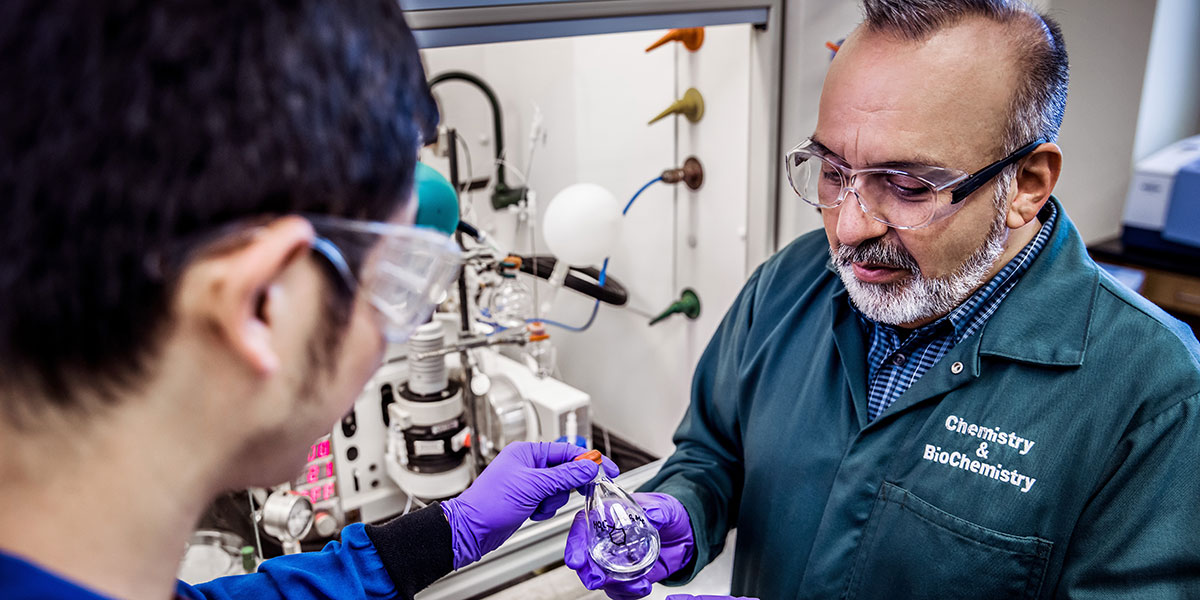Three ways R1 status will impact Baylor’s future

Baylor University entered the new year as a newly-minted R1 research university — now among the top tier of all research universities nationwide. The question now: How does R1 status impact Baylor’s future?
Here are three areas of note:
1. R1 status gives Baylor an incredible opportunity to show that top-tier research and Christian faith do, in fact, go together. Baylor’s Christian foundation and mission haven’t changed. It’s a rare stance in higher education, and an almost unique approach among R1 institutions.
“It’s important to me to show that there are overlaps between faith and science,” says Dr. Daniel Romo, Baylor’s Schotts Professor of Chemistry and co-director of the Baylor Synthesis and Drug-Lead Discovery Laboratory. “People can recognize that Baylor is doing good research, getting top grad students and doing the things that are required to get to R1 that also lead to new knowledge and understanding. That happens at a Christian university just as it does at a secular university, and it’s exciting to see that we’ll have a place at the table in addressing the world’s challenges in pursuit of truth.”
2. R1 recognition bolsters Baylor’s reputation. Dr. Erica Bruce, associate professor of environmental science, compares the honor to “name brands” that carry weight and are reflexively recognized for excellence. As an R1 institution, Baylor is now one of those brands.
“In everyone’s industry — whether we’re talking about colleges and universities or hospitals or products — there are those that stand out,” says Bruce. “If we’re talking about medicine, and you have a loved one who is diagnosed with cancer, you want to go where the best minds are doing the best work with the newest technology — places like the Mayo Clinic, St. Jude’s or M.D. Anderson. If we equate that to R1, you’re now putting Baylor in a category like that with other universities. We’re recognized with the names that everyone recognizes, like Harvard or MIT.”
Such recognition will make it easier for Baylor professors to compete for external research funding, supporting projects that impact the globe’s biggest challenges. Federal agencies, foundations, and anyone who supports research has to have ways to narrow down the large numbers of applicants; being R1 helps Baylor cross thresholds that matter.
3. R1 status will help Baylor with recruiting both faculty and students. The university has already announced plans to hire additional faculty — 100 over the next five years — and R1 recognition will elevate that pursuit. Incoming faculty, postdocs, and future students (grad and undergrad alike) will find they don’t have to choose between a top-tier research university and a Christian institution.
“The day the news broke, we immediately started using it in interviews,” says Bruce. “It’s something people recognize and want to be a part of. It’s validation not only for us, but for them — that they’re going to be able to conduct research or get an education that is top-notch. We are incredibly excited to recruit students, faculty and staff that will run with that and elevate it further.”
In other words, the R1 designation is a selling point that matters — a resume line that will open doors for Baylor in many new ways, from partnerships to funding to recruiting, further elevating the caliber of Baylor students and faculty who apply a Christian worldview to excellence in research and scholarship.
“Going forward, we’ll see that R1 is not a finish line, but a key step in our aspiration to have a seat at the table as a Christian voice in some of the most important conversations across our nation and around the world,” says Dr. Kevin Chambliss, vice provost for research. “R1 designation is confirmation that we’re headed there, and as we continue to work together, it’s exciting to think about what we’ll do in the years ahead.”
Sic ’em, Bears!

